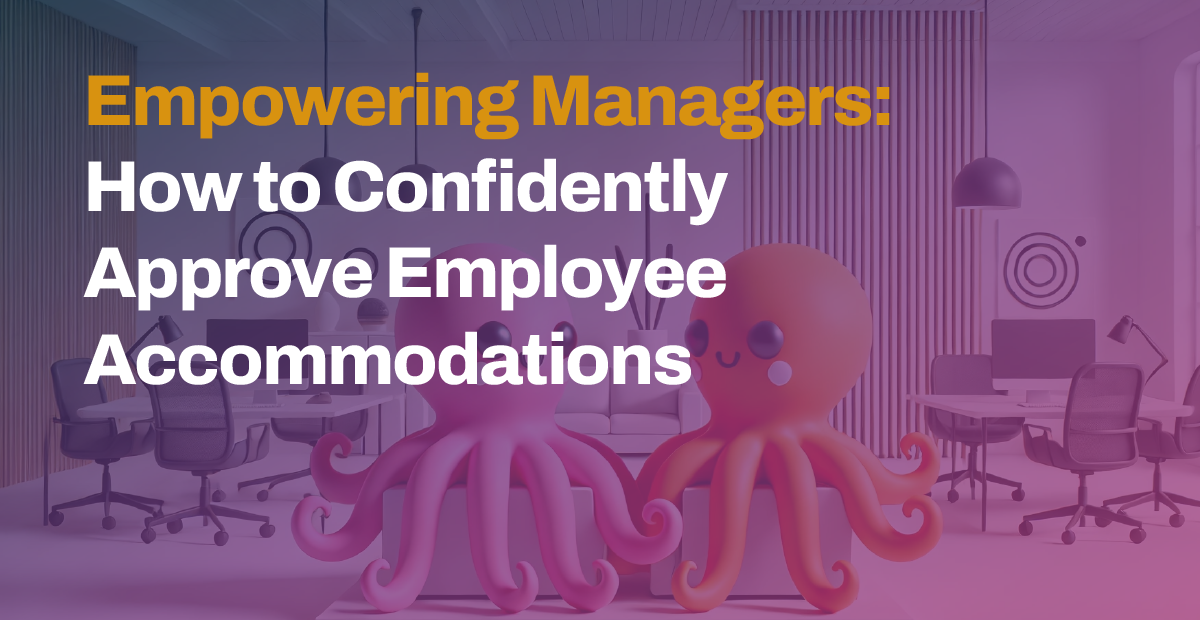Written by: Crosby Cromwell, CGO
It seems universal that almost everyone has had an amazing boss and great working environments, as well as the terrible ones who breed toxicity. I’ve learned important lessons from both experiences, but it’s just not possible to be your best and do your best when the working environment is not supportive of who you are as a person, what you bring to the table, and the tools you need to be great at your job.
For disabled employees, managers are often the first point of contact when seeking accommodations, and their response can significantly influence or derail the success of inclusive policies. I have seen firsthand the transformative impact that inclusive management can have on both employees and the workplace.
So, we are speaking directly to managers who are leading employees with disabilities. We want to offer practical ways to handle accommodation requests confidently and effectively, drawing from trends in disability identity, best practices, and established principles in disability advocacy.
Require Curiosity from Yourself
I have been rewatching the first season of Ted Lasso, which I do from time to time when I need to feel better about the world. There is a moment in episode 8 that I have pulled into my life as a guiding principle. Ted is playing darts to win a bet (I must insist that you watch the show if you haven’t), and just as he is about to throw his last couple of shots, he talks about a Walt Whitman quote that changed the way he sees human behavior, “Be curious, not judgmental.” Be curious, not judgmental.
The foundation of effective disability management lies in fostering a culture of curiosity rather than judgment, seeking out the unique perspectives and experiences of your employees before deciding what is needed or even possible. You cannot learn anything new if you do not seek to.
In practice, this means when an employee requests an accommodation, a manager’s first step should be to engage in open, protected dialogue in which the direct report feels empowered to talk about what they need. This approach helps understand the employee and dispels any preconceived notions about their request. Curiosity leads to better-informed decisions and fosters a more inclusive workplace atmosphere.
Create Safe Conversations
Creating a safe space for conversations about disabilities is crucial. Employees must feel comfortable discussing their needs without fear of discrimination or career repercussions. Managers can facilitate this by being approachable and ensuring confidentiality. Regularly communicating to your team that accommodations are a normal and expected part of workplace diversity can reduce stigma and encourage open dialogue.
Practical measures include having clear procedures for requesting accommodations and ensuring that these procedures are well-communicated and accessible to all employees. Training sessions that role-play conversations about accommodations can also be beneficial, providing managers with the tools they need to handle these discussions sensitively and effectively.
Take the time to educate yourself on the most recent trends of thinking of accommodations as a part of the suite of productivity tools that are available to any employee, regardless of disability.
Invest in Training and Mentors
Investing in regular disability awareness and management training is essential. Such training should not only cover the legal aspects of disability accommodations but also focus on the human side of managing diverse teams and what it means to know the social and identity models of disability. Training should be dynamic and continuous, and ideally led by a disabled trainer who can incorporate the latest best practices and feedback from employees about what works and what does not.
Training programs should be comprehensive, covering topics such as empathy, the types of accommodations available, how to handle requests, and how to follow up to ensure that accommodations are effective.
Managers must incorporate the training into the ways they lead and not leave a handbook on an unused shelf. Develop relationships with trusted advisors in HR (Human Resources), on the accommodations team, and internal disabled employees to be able to seek out advise and feedback.
Encourage Self-Identification (but only if the company culture backs you up)
Encouraging employees to identify their disabilities and what they need to do their job is a critical step towards providing appropriate accommodations. However, employees will only do so in an environment where they feel their information will be handled respectfully and confidentially. A strong company culture needs to lead the way, with processes and language in place to support managers. Managers should be transparent about the protections in place to safeguard employee information.
Promoting a culture where self-ID is seen as a strength rather than a vulnerability can empower employees to come forward. This can be reinforced by highlighting success stories within the organization where accommodations have led to improved employee satisfaction and productivity.
Five Tips for Empowering Managers
Lead with Empathy: Always approach accommodation requests with empathy and a willingness to understand.
Stay Informed: Keep up to date on the latest laws and best practices concerning disability accommodations.
Foster Open Communication: Encourage a culture where employees feel safe to express their needs.
Practice Inclusivity: Regularly review your team’s practices to ensure they are inclusive for all employees.
Follow Up: After an accommodation is made, check in with the employee to assess the effectiveness of the measure and adjust as needed.
By integrating these principles and practices, managers can confidently and effectively support their teams, ensuring that all employees have the necessary tools to succeed. This not only enhances individual performance but also drives collective success in a diverse and inclusive work environment.
And, just because I could not resist, here is the clip of the dart scene from Ted Lasso. Enjoy:
Get In Touch
Our team can help you learn more about integrating with Cephable.

